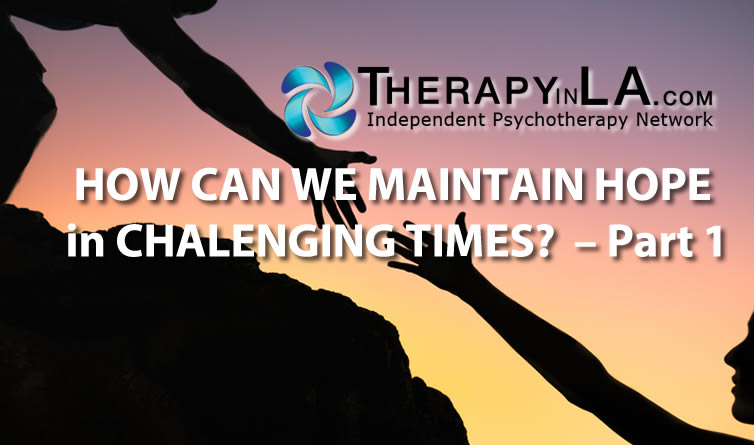HOW CAN WE MAINTAIN HOPE in CHALENGING TIMES? – Part 1
HOW CAN WE MAINTAIN HOPE in CHALENGING TIMES? – Part 1
Maintaining hope during the recent COVID surge in California and around the country is helpful, even essential, in many ways. Hope reduces anxiety, despair, and of course depression. We have more effective coping skills and recover from disappointments more quickly when we have hope. We are more skilled at problem solving, communicate better, and are more trusting of others. As parents, we are not only more patient, but more focused and effective with helping our children set goals, problem solve, and maintain their own hopefulness. (“Finding Hope When Everything Feels Hopeless”, Elizabeth Bernstein, New York Times). In less direct and observable ways, a more positive outlook also enhances our immune system.
There are two essential aspects of hope:
- “Agency: the motivation to achieve a desired goal.”
- “A strategy” to reach that goal.
While optimism is a belief in the future working out well, it is often a more vague feeling, without the two components above. Anthony Scioli, a professor of psychology at Keen State College in New Hampshire, identifies four “resources” for hope:
- “Attachment”: “a sense of continued trust and connection to another person.”
- “Mastery: “a feeling of being strong and capable”, as well as “having people you admire and people who validate your strengths.”
- “Survival”: “a belief that you aren’t trapped”, and an “ability to hold onto positive thoughts and feelings, even while processing something negative.”
- “Spirituality”: “a belief in something larger than yourself.”
A supportive therapy relationship focuses very much on “agency” and developing a “strategy”. If the therapy is meaningful and attends to your concerns, at the very least you will have an “attachment” to a steady, caring professional. All of the therapists with IPN will support your “mastery”, beliefs in your “survival” and the form of “spirituality” that is part of your life.
Part 2, to come, will focus on more concrete steps that can help generate and maintain hope.
Alan M. Solomon, Ph.D. is a clinical psychologist in private practice in Torrance, CA. A member of the Independent Psychotherapy Network, he can be reached at 310 539-2772, or dralanms@gmail.com Telehealth sessions are available by phone or video sessions.
Copyright 2020 by Alan M. Solomon, Ph.D.

